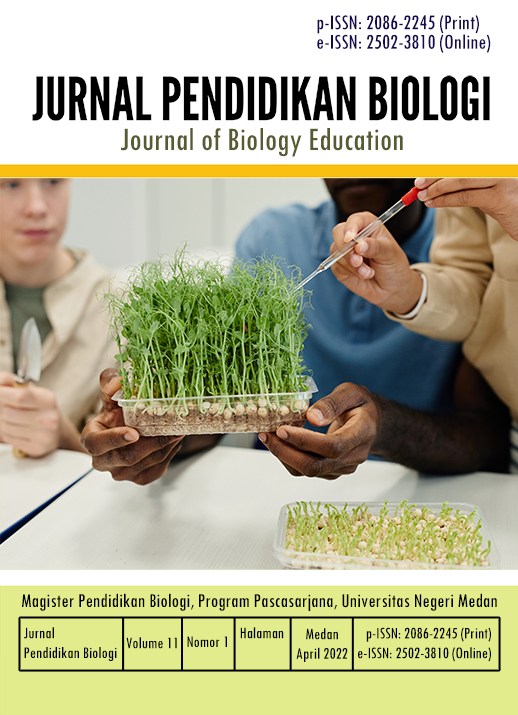The Influence of Science, Environment, Technology, Society (SETS) Learning Models on Learning Activities and Biology Learning Outcomes
DOI:
https://doi.org/10.24114/jpb.v11i1.24445Keywords:
Learning Activities, Learning Outcomes, Learning Model SETSAbstract
This study aims to determine the effect of the Science, Environment, Technology, Society (SETS) learning model on learning activities and biology learning outcomes. The sample of this research was students of class VII totaling 30 students people. The research data collection method is using data collection instruments in the form of learning activity observation and a written test in the form of multiple choice. Methods of data analysis of learning activities using the formula Weight Means Score and data analysis of learning outcomes is done by using the "ttest" test. The average result of the interpretation score is 3.30 with the interpretation number criteria interval from 3.25 to 4.00. The mean rate of this interpretation means that it falls into the œVery Active criterion. The prerequisite test proved to be normally distributed and homogeneous. The results of the ttest test calculation show that t count is 2.265 and t table is 2.048, so from these values it can be concluded that t count> t table. Based on the research results, it can be concluded that there is an influence of the science, environment, technology, society (SETS) learning model on biology learning activities. The benefit of this research is that it can find the right learning model to be applied to plant material and can be used as a reference for teachers in delivering material.References
Agustin, M. (2017). Upaya Meningkatkan Aktivitas Belajar Siswa dengan menerapkan model pembelajaran Problem Posing Tipe Pre Solution Posing di SMP Negeri 15 Kota Bengkulu. Jurnal Penelitian Pembelajaran Matematika Sekolah, 1(1), 66“72.
Ayuwanti, I. (2016). Meningkatkan Aktivitas dan Hasil Belajar Matematika Menggunakan Model Pembelajaran Kooperatif Tipe Group Investigation di SMA Tuma™ninah Yasin Metro. Jurnal SAP, 1(2), 105“114.
Dewi, P. R., Arnyana, I. B. P., & Maryam, S. (2020). Pengaruh Model Pembelajaran IPA Terpadu Bervisi SETS (Science, Environment, Technologi and Society) Untuk meningkatkan Hasil Belajar dan Sikap Ilmiah Siswa SMA. Wahana Matematika Dan Sains : Jurnal Matematika, Sains Dan Pembelajarannya, 14(2), 178“187.
Helmi, T. (2016). Kualitas Pelayanan Publik Dalam Pembuatan Izin Trayek oleh DLLAJ Kabupaten Bogor. Governansi, 2(1), 47“59.
Jaya, I., & Ardat. (2017). Penerapan Statistik untuk Pendidikan. Citapustaka Media.
Nizar, A. (2016). Metode Penelitian Pendidikan. Citapustaka Media.
Putra, S. H. J. (2021). Pendekatan Jelajah Alam Sekitar (JAS) : Dampaknya Terhadap Aktivitas dan Hasil Belajar Kognitif Siswa SMP. Journal of Natural Science and Integration, 4(2), 204“213.
Riwu, R., Budiyasa, I. W., & Rai, I. G. A. (2018). Penerapan Pendekatan SETS (Science, Environmen, Technology, and Society untuk Meningkatkan Hasil Belajar Biologi Siswa. Emasains, 7(2), 162“169.
Safitri, M., Yennita, & Irdus, I. (2018). Upaya Meningkatkan Aktivitas dan Hasil Belajar IPA Siswa Melalui Penerapan Model PBL. Jurnal Pendidikan Dan Pembelajaran Biologi, 2(1), 103“112.
Sarjono. (2020). Peningkatan Aktivitas dan Hasil Belajar Fisika Melalui Model Pembelajaran SETS (Science Environment Technologi and Society). Jurnal Penelitian Pemebelajaran Fisika, 11 (1), 101“108.
Sujana, I. W. C. (2019). Fungsi dan Tujuan Indonesia. Jurnal Pendidikan Dasar, 4(1), 29“39.
Syahrum, & Salim. (2016). Metodologi Penelitian Kuantitatif (R. Ananda (ed.)). Citapustaka Media.
Yahya, H. (2017). Pengaruh Penerapan Model Pembelajaran Quantum Teaching Terhadap hasil Belajar Biologi Siswa SMS Islam Terpadu Al-Fityan Gowa. Biotek, 5(1), 155“166.
Yulistiana. (2015). Penelitian Pemebelajaran Berbasis SETS (Science, Environment, Technology, and Society) dalam Pendidikan Sains, Prodi Pendidikan Biologi. Jurnal Formatif, 5(1), 76“82.
Zahra, M., Wati, W., & Makhbuloh, D. (2019). Pemebelajaran SETS (Science, Environment, Technology, Society) : Pengaruh Pada Keterampilan Proses Sains. Indonesian Journal of Science and Mathematics Education, 2(3), 320“327.https://doi.org/10.24042/ijsme.v213.4357
Downloads
Published
Issue
Section
License
Copyright (c) 2022 Jurnal Pendidikan Biologi

This work is licensed under a Creative Commons Attribution 4.0 International License.
Copyright
Penyerahan naskah menyiratkan bahwa karya yang diserahkan belum pernah diterbitkan sebelumnya (kecuali sebagai bagian dari tesis, laporan, atau abstrak). Naskah tidak dipertimbangkan untuk publikasi di tempat lain. Penerbitannya telah disetujui oleh semua penulis bersama. Jika dan kapan naskah diterima untuk publikasi, penulis masih memegang hak cipta dan mempertahankan hak penerbitan tanpa batasan. Penulis atau orang lain diperbolehkan untuk melipatgandakan artikel selama tidak untuk tujuan komersial. Untuk penemuan baru, penulis disarankan untuk mengelola patennya sebelum diterbitkan.
Open Access
Jurnal ini berkomitmen untuk membuka akses bebas yang tidak membebankan biaya kepada pembacanya atau lembaga mereka. Pembaca berhak membaca, mengunduh, menyalin, mendistribusikan, mencetak, mencari, atau menautkan ke teks lengkap artikel, selama tidak untuk tujuan komersial. Jenis lisensi adalah CC-BY-4.0.
Disclaimer
Tidak ada tanggung jawab yang dikenakan kepada Penerbit atau oleh editor untuk kesalahan dan/atau kerusakan pada naskah sebagai akibat dari pernyataan pencemaran nama baik atau dugaan pencemaran nama baik, pelanggaran hak kekayaan intelektual atau privasi, atau kewajiban produk, baik akibat kelalaian atau sebaliknya, atau dari penggunaan atau operasi ide, instruksi, prosedur, produk atau metode apa pun yang terkandung dalam materi di dalamnya.

